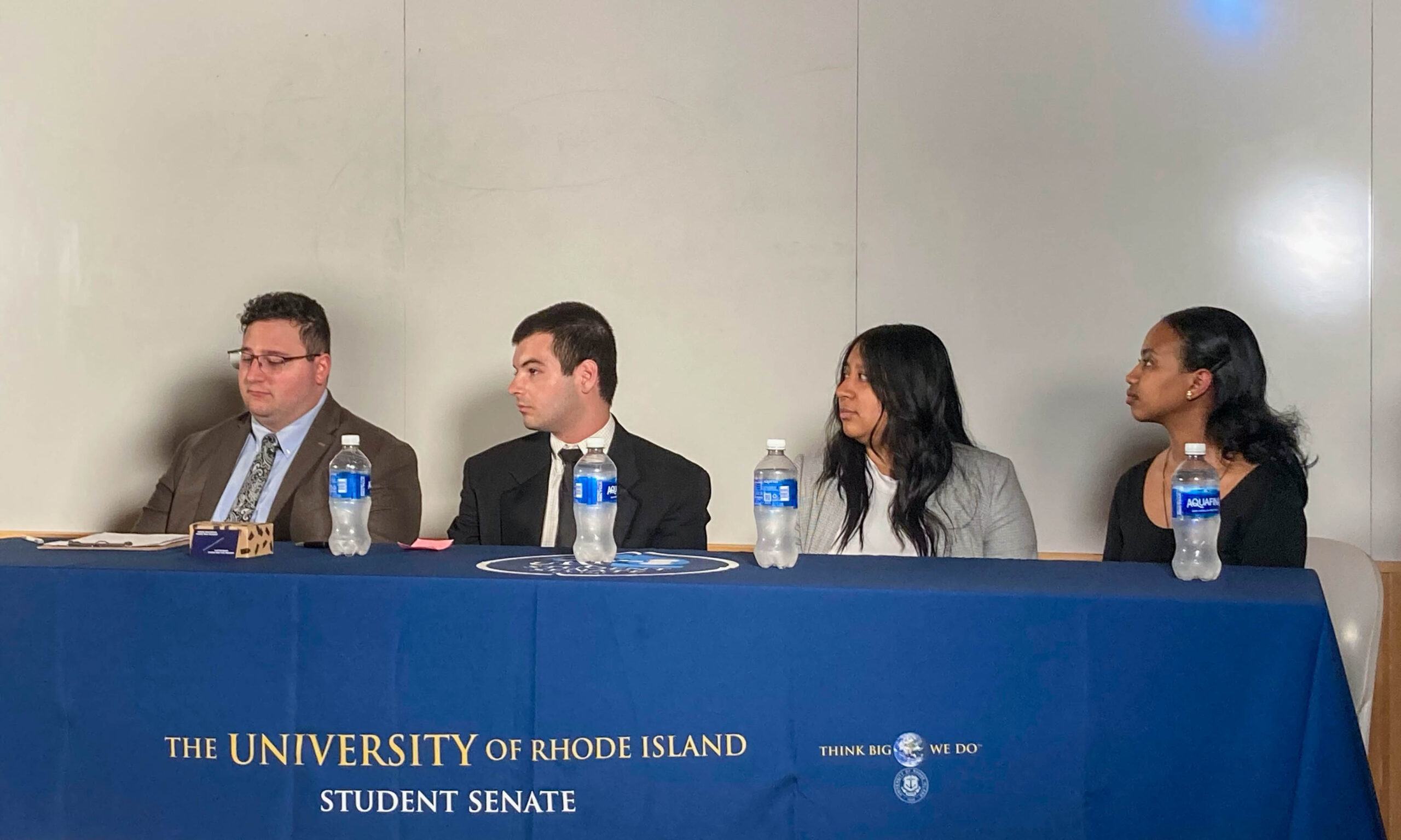University of Rhode Island Student Senate presidential and vice presidential candidates took the podium on Monday to share their stance on campus issues, upcoming plans and main initiatives at a debate in the Center for Biotechnology and Life Sciences.
Student senate Head Jurist Andrew Ebrahimpour ran for president against Cultural Affairs Committee Chair Meilin Quiroa Reyes in the senate’s first presidential and vice-presidential debate in two years.
Sen. Clayton Roach is running alongside Ebrahimpour for vice-president. Reyes’ vice-president running mate is Sen. Bitanya Hailu.
The Ebrahimpour-Roach partnership holds a priority to help student voices become heard, according to Ebrahimpour.
“Whatever we can accomplish, I assure you we will, whether it be protests here on campus, protests at the statehouse,” Ebrahimpour said. “We can really bog [the government] down to make sure our voices are heard.”
As an avid member of the URI Student Organization Leadership Consultants, Reyes said her goal as presidential candidate is to work toward, “empowering, supporting and advocating for student needs and values.”
Candidates were given one and a half minutes to state their main points on each election ticket question, according to Matthew Cayer, external affairs committee chair.
The URI student body submitted all ticket questions, according to Cayer. Leadership initiatives including strengthening marginalized voices, advocacy toward marginalized groups, student-faculty interaction, sustainability and immigration were brought up in the tickets.
As the treasurer of the Student Veterans Organization, Ebrahimpour said he was the driving force in setting up URI’s first military ball.
This leadership helped the organization gain $1,000 of funding from Sean Rogers, dean of the URI College of Business, and an additional $1,000 from President Marc Parlange, according to Ebrahimpour.
Ebrahimpour’s passion for veteran rights is shared by his running mate Roach, a member of the Army Reserve Officer Training Corps at the University of Rhode Island battalion.
Ebrahimpour and Roach have been working closely with Bob Flynn, director of the military veteran education center, according to Roach.
A third-year student, Reyes has been involved with the student senate since her first year at URI, serving as chairwoman for the cultural affairs committee for the past two years.
A global peer ambassador and sustainability ambassador, Hailu supports Reyes with a deep understanding of climate.
Hailu said her and Reyes have strong initiatives to continue advocacy for climate on campus.
“As one of the specialty ambassadors I work heavily with the president of Student Action for Sustainability, to have more initiatives, events and university spirit than programs that adhere to sustainability, ” Hailu said.
Another large initiative of the Reyes-Hailu campaign regards “Blue Zone” which will act similar to a safe zone, aiming to ensure advocacy for underrepresented communities including international students, low income students and military students, according to Reyes.
In her campaign, Reyes highlights that these “Blue Zone” efforts will be collaborative through work with existing Diversity Equity and Inclusion departments.
Surveys will be conducted in order to ensure that URI has the resources that students need on campus, according to Reyes.
A big part of the Ebrahimpour and Roach campaign is to build transparency between student-faculty interaction as a way to strengthen ties between all members of campus, according to Ebrahimpour.
This transparency would be fostered through communication, according to Ebrahimpour.
“I would like to be able to have an easier stream of communication for anyone who not only would have complaints about any type of faculty, but anyone who has anything good to say,” Ebrahimpour said. “We want a community where students, staff and faculty, have healthy means of community, not just in the classroom, but whether it be anonymous or with names attached.”
This transparency also involves DEI directors as well, whom their campaign plans to work closely with, according to Ebrahimpour.
“DEI directors are really our vehicle for our ability to push forward and be a louder voice to marginalized communities here on campus,” Ebrahimpour said. “I believe it’s our job to make sure they have everything they need to be successful.”
The presidential and vice-presidential debate lasted roughly 50 minutes. A third set of candidates, Maddie McTernan for president and Cassidy Kleinwaks for vice-president were not present at the debate, which came to a surprise for many students, according to third-year Cameron Hudson.
“A set of candidates didn’t come and I didn’t expect that, but for the two sets of candidates [who showed up] it went pretty good,” Hudson said. “Right now, I think I’m voting for Andrew and Clayton.”
The conversation was “Candid and authentic,” according to Debate Moderator Melissa Boyd.
“I feel like [Andrew Ebrahimpour] is a very good speaker, so he and vice president nominee Clayton have my vote,” third-year student Kairy Gonzalez said.
Voting is open on URInvolved. Results for presidential and vice-presidential nominees await.





